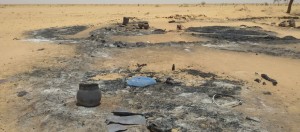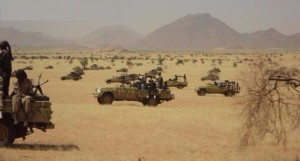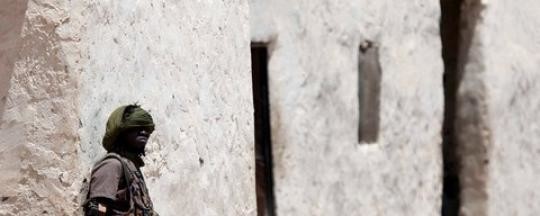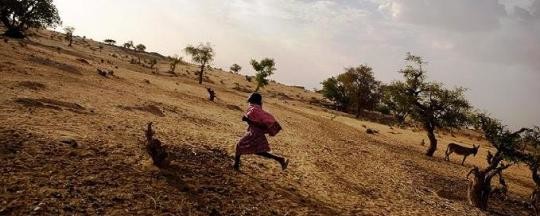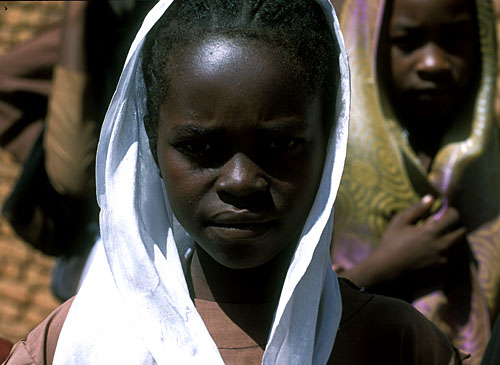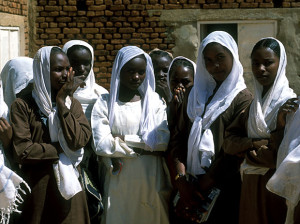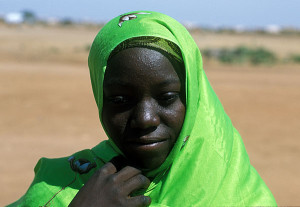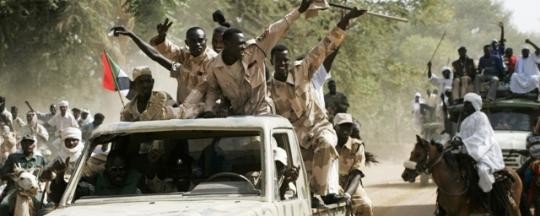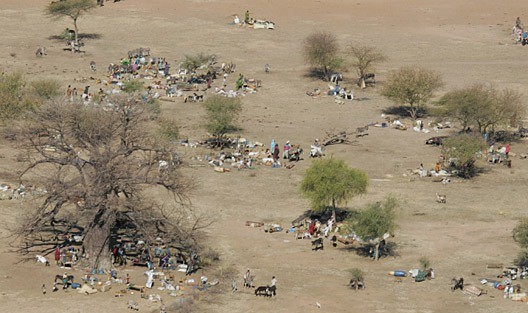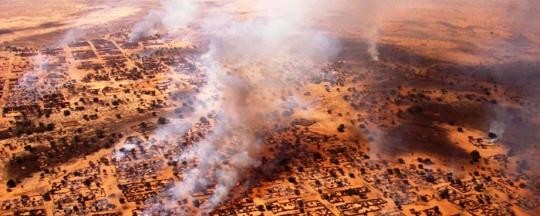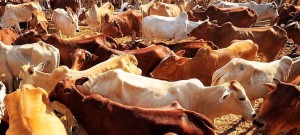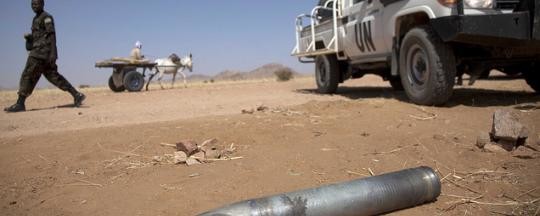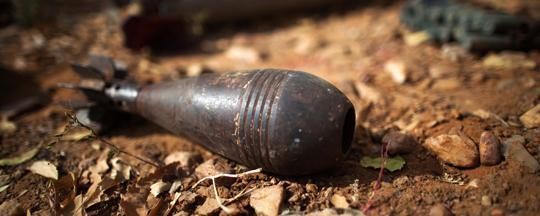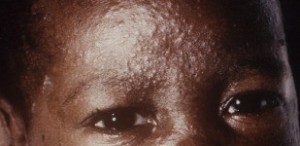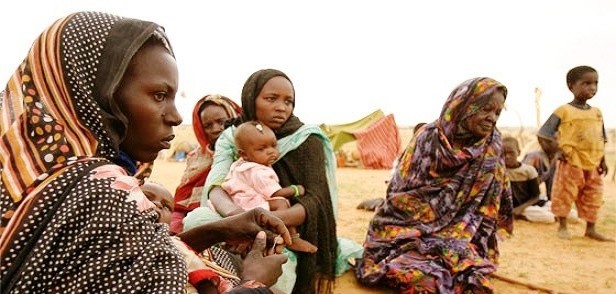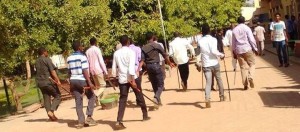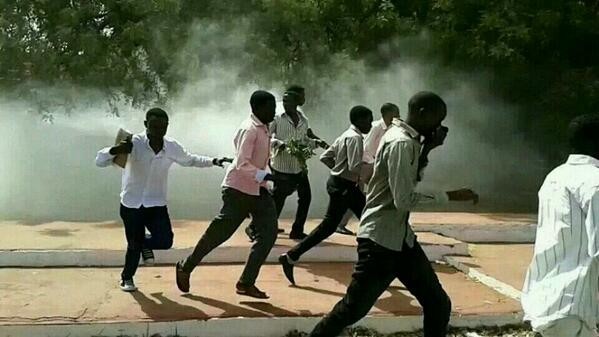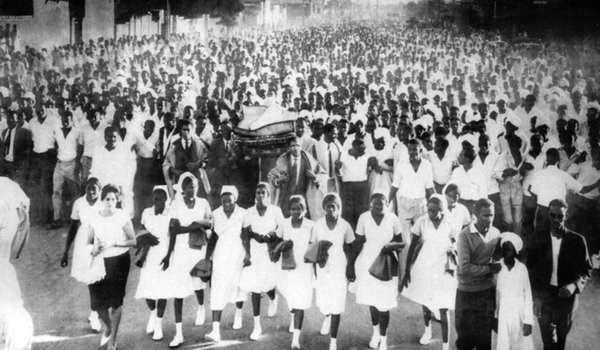This is the tenth installment of a digest containing what I believe to be the most important stories reported by Radio Dabanga in the previous week. Radio Dabanga continues to be by far our most important and reliable source of information about what is occurring in Darfur, and provides a great deal more than the UN/African Union Mission in Darfur (UNAMID), the UN Office for the Coordination of Humanitarian Affairs (OCHA), and the largely worthless quarterly reports of the UN Secretary-General.
In the further wake of Sudan’s electoral travesty, this week has been particularly dense with detailed news about violence in Darfur and issues affecting all of Sudan. Important stories also appeared in Sudan Tribune. Per usual, there are ten primary stories, with related stories in subsidiary positions in the text. Often, however, there are no compelling reasons for subordinating one story to another, as for example in the second heading here, relating to attacks against civilians this past week. Altogether there are eleven such stories, all giving an important sense of how vast the sea of violence has become in Darfur, and how little the international community has provided in the way of meaningful civilian protection.
I have again particularly emphasized in this digest that what is now called “Central Darfur” was formerly part of West Darfur (and to a lesser extent South Darfur). The further division of Darfur by the National Islamic Front/National Congress Party (NIF/NCP) regime in 2012 was arbitrary and entirely politically motivated; it has also worked to encourage geographical confusion (the western part of “Central Darfur,” for example, borders eastern Chad). Similarly, “East Darfur” was also created arbitrarily in 2012 from parts of South Darfur. Geographically, it designates the southeastern region of Darfur.
This emphasis on geographical clarification derives from the fact that while North Darfur and eastern Jebel Marra continue to be the site of the greatest violence in Darfur, reports from West Darfur (including what is now “Central Darfur”) as well as South Darfur (including what is now “East Darfur”) are increasing alarmingly.
Village destruction—whether in West, North, or South Darfur—is often total, as was the case in the early years of the genocide
Most notable among this week’s dispatches is Khartoum’s accusation that “[UNAMID] peacekeepers killed four civilians taken hostage inside the mission’s base.” Absent a fully credible investigation we can’t be sure what occurred near Kass, South Darfur. UNAMID vehemently denies Khartoum’s charges, and it must surely be borne in mind that the Khartoum regime and its military and official spokesmen have a long history of lying and denial, even when the facts available make nonsense of such responses.
But all this was reported after an earlier, ominous, and likely related incident: Khartoum’s refusal to allow the medical flight evacuation (medevac) of a badly injured UNAMID peacekeeper in West Darfur; the Ethiopian soldier later died of his injuries, perhaps for lack of access to a trauma center because of the denied medevac.
Together these and other similar incidents provide context for a decision that is imminent in the negotiations between the UN, the African Union, and the Khartoum regime about the re-authorization of UNAMID; current authorization expires in less than two months (June 30, 2015). What we may see in both of these incidents is Khartoum’s creating significant “facts on the ground”:
[1] Hostility on the ground by the regime’s militia forces and regular troops, as well as rising animosity on the part of the regime, will define the environment for any re-authorized force, which confidential sources make clear will be substantially re-configured, as well as severely reduced in size.
[2] Efforts to make UNAMID a greater burden to the UN and African Union will continue. Challenges will multiply. Visas will be delayed as they have in the past, sometimes for as long as two years. Various weapons and weapon systems will be denied the re-authorized mission, and peacekeepers will be much more vulnerable as a consequence. A new “Status of Forces Agreement” (SOFA) will certainly contain provisions allowing Khartoum to impede, obstruct, or deny access any re-authorized force; these actions occur now, but are in contravention of the SOFA negotiated in February 2008.
Even as the NIF/NCP regime is pushing for UNAMID’s “exit,” there are growing signs of civil unrest, especially in universities in several locations around the country. Radio Dabanga is able to provide a highly detailed account of this growing threat from a populace that overwhelmingly longs for “regime change.”
All dispatches have again been edited to some degree for length; any editorial comments on my part appear italicized in [brackets] and in blue; all emphases within the cited texts have been added.
Eric Reeves, 3 May 2015
Darfur: Radio Dabanga Digest, Number 1 | http://wp.me/p45rOG-1CD
Darfur: Radio Dabanga Digest, Number 2 | http://wp.me/p45rOG-1De
Darfur: Radio Dabanga Digest, Number 3 | http://wp.me/p45rOG-1Dt
Darfur: Radio Dabanga Digest, Number 4 | http://wp.me/p45rOG-1Ei
Darfur: Radio Dabanga Digest, Number 5 | http://wp.me/p45rOG-1EL
Darfur: Radio Dabanga Digest, Number 6 | http://wp.me/p45rOG-1Fp
Darfur: Radio Dabanga Digest, Number 7 | http://wp.me/p45rOG-1FL
Darfur: Radio Dabanga Digest, Number 8 | http://sudanreeves.org/2015/04/19/6452/
Darfur: Radio Dabanga Digest, Number 9 | http://wp.me/p45rOG-1Gi
Darfur: Radio Dabanga Digest, Number 10 | http://wp.me/p45rOG-1Gt—and below
**********************************
• Darfur peacekeeper dies as Sudan denies evacuation request
April 28, 2015 | New York
The Sudanese government denied a flight request for an emergency medical evacuation of a UNAMID peacekeeper on Sunday. He died from his injuries, sustained in West Darfur, hours later.
[This is not the first time that Khartoum’s military has denied medevac permission to mortally wounded soldiers. For example, three members of the UN Interim Security Force in Abyei (UNISFA) were denied medevac from Abyei to nearby Kadugli (capital of South Kordofan). Two were likely to have died, but one might well have survived if he had reached the Kadugli hospital in timely fashion.]
UN Secretary-General Ban Ki-moon deeply regrets the decision by the Sudanese government. In a press statement on Monday… Ban Ki-moon called on Khartoum to respect the Status of Forces Agreement signed with the UN and lift all restrictions placed on the joint peacekeeping mission with the African Union in Darfur, UNAMID…
The Secretary-General further expressed his concerns about the recent increase in the number of attacks on UNAMID soldiers, “and the limited cooperation provided by the Government of Sudan in addressing these incidents.” He pointed to and condemned the two attacks by “unidentified armed groups” that took place in Kass, South Darfur, on 23 and 24 April.
[Whatever the fate of UNAMID after its current authorization expires on June 30, we may expect to see an escalation of attacks on any force that remains, as Khartoum attempts to compel a complete withdrawal. The regime has a long, well-documented responsibility for many of the most deadly attacks on UNAMID peacekeepers. See:
“Khartoum’s Military Forces Deliberately Attack a UNAMID Convoy,” Sudan Tribune, 14 January 2008| http://www.sudantribune.com/spip.php?article25579 ]
“Killing UN Peacekeepers: A Ruthless Proclivity of Khartoum’s SAF, Militia Proxies,” Sudan Tribune, 9 May 2013 | http://www.sudantribune.com/spip.php?article46513
“Violence in Hashaba, North Darfur: A brutal portent, another UN disgrace,” Sudan Tribune, 30 October 2012 | http://www.sudantribune.com/spip.php?article44379
“Attack on UNAMID Forces in Darfur: The Khartoum Regime is Responsible,” Genocide Prevention Advisory Network, 12 July 2008 http://goo.gl/S4ZzyA ]
According to the mission, six peacekeepers were wounded and four attackers killed when UNAMID troops returned fire in self-defence. Ban Ki-moon urged Sudan to bring the perpetrators of the attacks to justice. The peacekeeping mission has launched its own investigation into the incidents. UNAMID officials said that their peacekeepers responded appropriately when they were attacked, and claimed that an erroneous version of the events is being put out to misinform the public and the Sudanese government.
Sudanese government condemns “unjust reports” on UNAMID incidents
April 30, 2015 | Khartoum (including reporting from Sudan Tribune)
Sudanese authorities have criticised UNAMID, the United Nations, and the African Union for not taking responsibility for the “crimes” allegedly committed by peacekeepers near Kass in South Darfur on 23 and 24 April. In a statement on Wednesday, the Ministry of Foreign Affairs strongly condemned the incidents, and accused the joint UN-AU peacekeeping Mission in Darfur (UNAMID) of seeking to cover up the crimes.
According to UNAMID, a group of armed men opened fire on a peacekeepers’ patrol at a water well near Kass last Thursday evening. Four of the assailants were killed in the ensuing gunfight, and one was injured. Two peacekeepers sustained injuries too. On Friday morning, another UNAMID patrol was reportedly attacked near the mission’s base in Kass. Four peacekeepers were wounded, a spokesman for UNAMID told Radio Dabanga. UNAMID head Abiodun Bashua strongly denied that the peacekeepers attacked civilians. “In both incidents, UNAMID troops returned fire, but did not initiate any shooting; they only acted to protect themselves.”
Bashua stated that the mission has evidence that “the attackers, who were riding on horses and camels, were armed with AK-47 assault rifles, with which they shot at the peacekeepers.” The peacekeepers’ response therefore was “appropriate and proportional.” Sudan Tribune reported that its correspondent in South Darfur cited UNAMID patrol soldiers as saying that a group of gunmen tried to steal their vehicle, which forced them to use their weapons…. Ban Ki-moon had expressed his regrets about “the limited cooperation provided by the Government of Sudan in addressing these incidents.”
[The “cooperation” by Khartoum is not limited, it is non-existent: the regime is actively engaged in creating an unsustainably insecure environment for UNAMID (see above).]
In a press conference in Khartoum on Wednesday, Jamal El Sheikh, head of the government delegation of the Sudan-UN-AU team developing UNAMID’s departure from Darfur, and member of the government’s committee investigating the incidents, said that the peacekeepers had killed four civilians taken hostage inside the mission’s base. A preliminary investigation concluded that the victims sustained various bullet wounds…. El Sheikh furthermore called UNAMID’s claims that the peacekeepers were targeted, are “nothing but an attempt to drive a wedge between the Sudanese government and the AU.” He accused unnamed agents and countries of a hidden agenda behind the continued presence of the mission in Sudan.
[Such comments from the head of the regime’s delegation to negotiations on the future of UNAMID augur extremely poorly for the prospects of a meaningful civilian protection force emerging with support from Khartoum.]
The Sudanese government requested UNAMID’s departure from the country in November last year, after more than 200 women in the village of Tabit in North Darfur were raped at the end of October, and the peacekeepers’ mission’s had demanded a thorough investigation.
[Cause and effect here are not difficult to discern, although Khartoum had already been pushing hard to see a UNAMID “exit strategy” implemented.]
President Al Bashir stated on 30 November that UNAMID had become a “security burden” on the Sudan Armed Forces. “Instead of offering the Sudanese army support in protecting the civilians in the region, they are protecting the rebels.” Therefore, he said, UNAMID should develop a “clear exit programme.” Khartoum has since insisted that 15,000 peacekeepers be withdrawn by the end of this year. [There are currently 17,000 uniformed UNAMID personnel in Darfur.]
Sudan files charges against UNAMID in South Darfur incident
SUDAN TRIBUNE, May 1, 2015 | Kass, South Darfur
The prosecutor’s office in the locality of Kass in South Darfur has filed charges against the hybrid peacekeeping mission in Darfur (UNAMID) demanding lift of immunity from the mission’s troops involved in the recent killing incident in prelude to put them to trial…
The peacekeeping mission [also] says a second patrol travelling from Nyala was attacked by the gunmen near the UNAMID’s base in Kass on the morning of 24 April.
Both the United Nations secretary general, Ban Ki Moon, and the head of the of the African Union commission, Nkosazana Dlamini Zuma, underscored the peacekeepers have been attacked by the armed gunmen, saying they returned fire in self-defence. UNAMID acting chief Abiodun Bashua also rubbished the government’s claims stressing that his troops “returned fire but did not initiate any shooting” and “only acted to protect themselves.”
[Khartoum has lied, and lied baldly, on so many occasions over the past 26 years—and is so deeply complicit in the most deadly attacks on UNAMID forces—that as weak as UNAMID leadership has been in the past, there is no reason to doubt Bashua or his claim to have evidence about what really occurred near Kass (perhaps photographic documentation of the attacks).]
• Gunmen attack leaves Haraza in South Darfur “desolate”
April 29, 2015 | Katila Locality, South Darfur
Gunmen attacked Haraza in the northern part of Katila locality in South Darfur on Monday. “A group of about 100 armed men, some in two vehicles, and others riding on horses and camels stormed the administrative unit of Haraza on Monday. “They robbed the people of their money and belongings, and chased them from the area. They then torched the market, a number of houses and tents, and the offices of the paramilitary Popular Defence Forces (PDF),” Salah Osman Idris, Commissioner of Katila locality told reporters on Tuesday. “Before they torched the PDF offices, they seized all the arms and ammunition from the stores,” he added. The commissioner stressed that all the people at the area fled. “Haraza has become entirely desolate.”
The Rapid Response Forces (RSF) on the move
[An attack on the PDF suggests that disintegration of the militia forces in Darfur has begun in a serious way. The evidence would suggest that Khartoum has given the extremely well-armed Rapid Support Forces (RSF) their primary support, and expects in return that these brutal forces do their bidding, at least for the most part. But even the RSF has defied Khartoum on a number of occasions.]
Two killed by militiamen in Darfur cities
May 1, 2015 | Zalingei, formerly West Darfur / Nyala, South Darfur
Two civilians were killed in separate incidents involving pro-government militiamen in [formerly West] and South Darfur on Thursday. One man was killed on Thursday evening inside his home in Zalingei [in formerly West] Darfur. A relative of the killed Muawiya Abdel Salam Nasr reported to Radio Dabanga that… “They shot Muawiya in front of his family members, and he died on the spot.”
In Aljir neighbourhood in Nyala, capital city of South Darfur, a civilian was shot dead by pro-government militiamen. They took his properties after killing him, a source in Nyala said. He added that in Congo neighbourhood in northern Nyala, a force of the police clashed with militiamen. They used heavy weapons during the clash. The fighting has caused a panic amongst the residents.
Militiaman in Darfur town
[It is simply impossible to say in many cases which militia group, or armed bandits, are responsible for the murders, the extortion rackets, the rapes, or the assaults on IDP camps. RSF attacks are usually distinguished by their size and the nature of the weaponry, number of vehicles, and the uniforms worn by the attackers. Here again we come up against what Human Rights Watch has called “chaos by design”: Khartoum feels that it benefits militarily if Darfuris kill Darfuris, as was the case when Southerners killed Southerners in the long civil war. It is an irony more than grim that Southerners, in an independent South Sudan, are now again killing one another.]
“Robberies by militiamen in South Darfur camp continue”: elder
May 1, 2015 | Nyala, South Darfur
Internally displaced people living in Otash camp in South Darfur are fed up with the continuous attacks by militiamen, who break into shops and homes at night and rob people on the roads. Checkpoints, set up by paramilitary troops, are impeding the movement of civilians in [formerly West] Darfur.
One of the sheikhs in the camp, east of Nyala city, told Radio Dabanga that the camp has witnessed “a series of attacks and acts of robberies during the past few days at the hands of pro-government militias.”
Other incidents that demonstrate the insecurity in Otash camp include the killing of two camp residents, both opponents of the election, on 12 April. That same night, a humanitarian volunteer was found stabbed to death, according to a camp elder. On 30 March, militiamen shot dead Sheikh Ahmed Idris Abu Shama inside his shelter at the camp.
[The militia forces, and the RSF in particular, enjoy complete immunity from prosecution for their crimes, even when their victims are those displaced into camps. The overwhelming percentages of these victims are from non-Arab or African tribal groups, even as the militias are overwhelmingly made up of Arab tribal groups.]
Meanwhile, one of the three health organisations in Otash will be unable to continue providing health services to the displaced people there and in Um Dafug area. The Rufaida Health Organisation is the only health service provider for the estimated 7,000 displaced people, and 9,300 returnees in the area of Um Dafug, according to the UN humanitarian office (OCHA) in April.
[The ending of medical services by the Rufaida Health Organisation represents yet another blow to humanitarian capacity in Darfur. That they have not been funded internationally needs explanation from the UN’s OCHA.]
In Nierteti locality in [formerly West] Darfur, residents have complained about the establishment of about eight checkpoints along the road between Nierteti and Tur. The points were set up by members of the Rapid Support Forces (RSF) on Sunday. One of the affected residents said: “This paralysed the movement of civilians, especially the people who shop and go out to collect firewood and straw. They fear to be attacked or robbed by the Rapid Support Forces.”
[These checkpoints have proliferated in recent years and have contributed to the economic collapse of Darfur. People cannot reach markets with goods and to provide services, and those who need to purchase key items—preeminently food—are denied the opportunity. This simply could not occur without Khartoum’s knowledge and approval.]
Abductions by security forces, militiamen in Darfur
May 1, 2015 | Kalma Camp, South Darfur / Nierteti, Mukjar, West Darfur
Two students were taken to an unknown destination by members of the security apparatus in South Darfur, and three men were abducted by militiamen in [formerly West] Darfur, on Thursday… The two were “attacked by security forces in vehicles” in the morning, while they were on their way to work in brick factories near the camp. They were taken to an unknown destination. In another abduction in [formerly West] Darfur that day, pro-government militiamen took three men from the outskirts of Nierteti. Abdel Nasir Ali Suleiman, Elias Ahmed, and Mohamed Mohamed Ahmed were taken to west of Nierteti, a relative of one of the abductees said. “The pro-government militiamen on camels and horses attacked them while they were coming back from the village of Omi, after doing shopping at the weekly market. They abducted them at gunpoint to Khor Ramla, west of Nierteti.”
[Abductions serve various purposes: silencing political dissidents; creating an atmosphere of fear and intimidation; and extorting money from the families of those abducted. While it is not always clear which motive predominates in a given incident, collectively the abductions are part of a campaign of terror and self-enrichment by Khartoum’s militia allies.]
Boy run over by RSF militia car in South Darfur camp
April 27, 2015 | Gereida, South Darfur
A boy from Um Haleeb camp for the displaced near Gereida was crushed to death by a vehicle of the paramilitary Rapid Support Forces (RSF) in South Darfur on Sunday. Speaking to Radio Dabanga from Um Haleeb camp, a sheikh reported that an RSF convoy of about 150 vehicles passed through the camp, driving at an excessively high speed. “One of the cars hit Adam Ali Mohammed (13). He died instantly,” he said. “The car did not stop.” The sheikh added that the militia troops fired heavily into the air while they were passing, which “terrified the camp residents immensely.”
[The casual disregard, indeed contempt for civilian life has become a hallmark of the Rapid Response Forces—they are every bit as vicious as the “old Janjaweed” and considerably better armed as well as more cohesive.]
Eight killed in clash over cattle rustling in [formerly South] Darfur
April 27, 2015 | Ed Daein, formerly South Darfur
Eight people were killed, and one was wounded in Abu Karinka locality, East Darfur, on Sunday, in a clash between a “rescue team” and a group of cattle rustlers. Mohamed Ahmed El Dud, head of the [formerly South] Darfur Local Government Bureau, told Radio Dabanga from the capital of Ed Daein that when a local rescue team tracing stolen cows found the thieves in the area north of Abu Dungul, north of Keleikeli Abu Salama, a gunfight erupted. “Four cattle thieves and four members of the team were killed. One cattle thief was injured.” El Dud explained that both parties have been stealing cattle from each other since some time.
[The rule of law has almost entirely disappeared in Darfur, and conflict often escalates to extremes as a consequence.]
Four injured at Abu Shouk camp market, North Darfur
April 27, 2015 | Abu Shouk Camp, El Fasher, North Darfur
Four people sustained bullet wounds when gunmen opened fire at the Naivasha Market in Abu Shouk camp for the displaced in North Darfur on Saturday. The El Fasher livestock market was closed on Saturday after nine shops were plundered. Speaking to Radio Dabanga, an Abu Shouk camp elder reported that Sudani Ismail, Adam Rasheed Adam, Alawiya Abdelrahman Yasir, and a five-year-old girl named Lateefa Abdelkareem were wounded when militiamen suddenly started to shoot around them at the Naivasha Market…
[There are no safe havens; no place is truly secure; and the markets within the camps for displaced persons have come to be perceived as highly lucrative targets by Arab militia forces.]
Sudanese-Chadian troops torture villagers in West Darfur
April 27, 2015 | Sirba Locality, West Darfur
Members of a joint Sudanese-Chadian force detained five villagers in Sirba locality on Wednesday. After severely beating and torturing them, they released them again on Saturday. The coordinator of the Sirba camps for the displaced explained to Radio Dabanga that the reason for their detention was a weapon, a member of a government-backed militia claimed to have lost near the village of Goz Bagar early last week. “Members of the joint Sudanese-Chadian border forces, stationed at Bir Saliba, began searching the houses of Goz Bagar one by one. When they found the alleged weapon, they detained El Sadeg Ishag Abakar, Mahmoud Suleiman Yousef, Yahya Adam Ismail, Mohamed Adam, and El Nur Erwa. “The five villagers were severely beaten and tortured for three consecutive days, after which they were released,” he reported. “They are in a very bad physical and mental condition.”
[We have no way of knowing whether the theft of a weapon was simply pretext or indeed a fabrication; what we do know is that the brutality meted out to these five men, including torture, is now the norm in Darfur.]
Displaced molested by militiamen in West Darfur’s Sirba
May 3, 2015 | Sirba Locality, West Darfur
A group of militiamen beat up five residents of the Ban Jadeed camp for the displaced in Sirba locality on Wednesday. A camp elder told Radio Dabanga that government-backed militiamen ambushed three displaced women not far from the camp. When they resisted the attackers, two men from the camp intervened. “Maimouna Hassan, Hawa Ibrahim, Fatima Adam, Hammad Adam, and Mohammed Adam were subjected to severe beating and whipping. All five had to be treated at Sirba hospital,” he reported.
Woman in flight
Women, girl gang-raped in West Darfur’s Sirba
April 30, 2015 | Sirba Locality, West Darfur
A group of militiamen raped three young women in the area west of Sirba camp for the displaced in West Darfur on Tuesday. “Five militiamen, wearing military uniforms, ambushed two women and a girl aged 14, when they were returning to the camp with firewood,” the coordinator of the Sirba camps reported to Radio Dabanga. “The men raped the women alternately at gunpoint,” he said. “The girl had to be taken to the hospital as she was found in a critical condition after been raped for hours.”
Girls and women who are the targets in the epidemic sexual assaults that are an integral part of war against the African tribal populations of Darfur
[These accounts of the terrible consequences of rape for young girls are perhaps the single most difficult reading I do in the course of my work on Darfur; I find it simply soul-destroying to read a sentence like this: “The girl had to be taken to the hospital as she was found in a critical condition after been raped for hours.”]
RSF militia troops rape two women, rob villagers in [formerly West] Darfur
April 30, 2015 | Nierteti Locality, [formerly West] Darfur
Members of the Rapid Support Forces (RSF) raped two young women in the area of Jildo, Nierteti locality, on Tuesday. They further robbed a number of people at gunpoint. One man was seriously injured. A villager told Radio Dabanga from Jildo that the paramilitary RSF troops, commanded by the security apparatus, are wreaking havoc and molesting people living in the area during the past two days. “The most recent assaults were the gang-rape of two young women, aged 20 and 17, and the robbery of a number of people from the neighbouring villagers on their way to the Jildo market,” he reported. “Omar Karam sustained critical injuries, when he confronted the robbers.”
[Rape continues at epidemic proportions throughout Darfur, certainly not only in North Darfur. From the beginning of genocidal violence in 2003, rape has been used as a terrible weapon of war, with clear ethnic animus.]
He said that residents of the area informed the military commander of Jildo garrison and the commissioner of Nierteti locality about the assaults, but both told them that they do not have any authority over the RSF militia. “The people gave the authorities 72 hours to resolve the problem and protect them from those militiamen. Otherwise, they will leave the area to seek refuge in Nierteti town and other places.”
The Rapid Response Forces are the key Arab militia force for Khartoum in Darfur
[It is futile for anyone in Darfur to expect protection from the predations of the RSF: they answer only to Khartoum, and not on all occasions.]
• Hundreds of newly displaced in Yassin, [formerly South] Darfur
May 1, 2015 | Yassin, [formerly South] Darfur
Over sixty percent of the newly internally displaced people in East Darfur’s Yassin town are living under trees, according to findings of an inter-agency mission. The mission visited the town on 20 April to assess the needs of newly displaced people arriving in the town following violence triggered by cattle theft in Kweikai village (about 10km from Yassin town) on 31 March. According to aid organisations, Kweikai village was burned to the ground during the violence and residents lost all their possessions. Of the estimated 1,000 people displaced in Yassin town, 400 people are now hosted by the local community, with the remaining 600 people sheltering under trees, according to the latest humanitarian bulletin by the UN humanitarian office (OCHA).
Recently displaced civilians in Darfur
[Human displacement remains an immense and increasingly critical problem in Darfur. People continue to be displaced at the same rate as in 2014, when some 500,000 people were newly displaced. The total is currently over 2.5 million internally displaced persons, and almost 400,000 Darfuri refugees in eastern Chad. Who will provide for their needs if humanitarian organizations are compelled by insecurity to withdraw from Darfur? Such withdrawal is all too likely is Khartoum has its way in the downsizing and re-configuring of a UNAMID successor.]
All newly displaced people are in need of food, emergency household items and shelter supplies, the mission said. The nearest water source is two hours walk from Kweikai village, however, as most donkey carts were destroyed in the attack. People are now required to walk this distance carrying heavy loads.
According to the Sudanese Humanitarian Aid Commission (HAC), Kweikai village is now safe for return and those displaced are willing to return home. Consequently, HAC and aid organisations will be providing people with assistance at their village of origin. Since Kweikai village was burned down, organisations including the World Food Programme and the NGO Tearfund are considering food-for-work programmes and the provision of emergency household supplies for the displaced, during village reconstruction.
[The cruel joke of “safe returns” has been played too many times on Darfuris in recent years, and they are rightly deeply distrustful.]
• Villagers killed as Sudan’s soldiers and rebels clash in South Darfur
April 26, 2015 | Tullus / Dimsu, South Darfur
Villagers were killed in an air strike by the Sudanese Air Force on the village El Tomat, south of Tullus, on Sunday. Serious fighting between armed rebels and government forces took place in Tullus and surrounding localities that day, with both sides claiming to have inflicted heavy losses on each other. El Tomat is located about 50 km south of Tullus. Two witnesses in the area told Radio Dabanga that an entire family was among the sixteen dead. They were in the market at the time of the strike. More than eleven people sustained injuries…
Um Zeifa village in South Darfur after an attack by government-backed militiamen (Human Rights Watch)
[In March 2005—over a decade ago—the UN Security Council passed Resolution 1591 banning all offensive, thus all, military flights in and over Darfur. It is a disgrace to the idea of an international community that such bombings continue relentlessly, with impunity, and with terrible destructiveness.]
Sudan bombs kill cattle in East Jebel Marra, Darfur
May 1, 2015 | East Jebel Marra, North Darfur
The Sudanese Air Force targeted a village in East Jebel Marra, in the heart of the Darfur region, on Friday. The aerial bombardment did not lead to any casualties, although a number of cattle were killed, and large tracts of grasslands and forests were burned. A witness told Radio Dabanga that an Antonov plane dropped seven bombs in the area north of Malam at 1pm. The explosion set fire to the surrounding forests and grasslands, and caused panic among residents in the area.
[It cannot be stressed too often that the Antonovs are retrofitted Russian-built cargo planes from which shrapnel-loaded barrel bombs are simply rolled out the cargo bay. There is no bomb-siting mechanism and the slow-moving Antonovs fly at high altitudes to avoid ground fire. They have no militarily useful accuracy. They are weapons of civilian destruction and terror. The same is true of Khartoum’s relentless attacks in Blue Nile and South Kordofan states.]
• Rizeigat, Ma’aliya clash in [formerly South] Darfur’s Abu Karinka
April 29, 2015 | Abu Karinka Locality, formerly South Darfur
At least 16 people were killed and injured in renewed clashes between Rizeigat and Ma’aliya tribesmen in Abu Karinka locality today. Speaking to Radio Dabanga, multiple witnesses reported that fighting erupted early this (Wednesday) between Rizeigat and Ma’aliya in the area of Wad El Bilal, west of Abu Karinka town, against the backdrop of mutual livestock rustling. “The clashes started at 7am, and lasted about five hours,” they said. According to the witnesses, both parties used Land Cruisers, mounted with machineguns. They said that the situation is very tense, with large gatherings of militant tribesmen in the area.
The commissioner of Ed Daein locality, Ali Taher Sharef, confirmed to Radio Dabanga that a clash took place near Abu Karinka. Yet, he strongly denied the tribal element…
Cattle are a major source of tension between Arab tribal groups
[In fact, inter-Arab tribal fighting has been one of the most significant and deadly developments in the Darfur conflict in recent years. As resources of all kinds seem to be up for grabs, competition for these resources that would have been unthinkable thirty years ago has become inevitable. Many of the tensions derive from the fact that while some Arab tribes contributed heavily to the Janjaweed in the early years of the genocide, others saw that such conflict would benefit no one and refused to participate, actively discouraging young men from joining the militia forces Khartoum so insistently recruited. Individual cases and particular conflicts are inevitably complex and difficult to judge without a context that we don’t have; but there is no reason to expect that such inter-Arab tribal fighting will end soon.]
• Detonating UXO kills herder in Darfur’s East Jebel Marra
April 29, 2015 | East Jebel Marra
A herder in East Jebel Marra, North Darfur, was killed on Tuesday when a piece of unexploded ordnance (UXO) detonated. “Abdelhalim Omar Adam (21) was herding his camels in the area of Turbo, south of Dubo El Omda, when a war remnant exploded. He died instantly, together with two of his camels,” a witness told Radio Dabanga. He also reported that the Sudanese Air Force is conducting “intensive flights above the area, without dropping bombs.”
Unexploded missile on road to Tabit, North Darfur (UNAMID/2011)
Grenade blast kills two children, injures four in North Darfur
April 30, 2015 | Dankoj Camp
Two children were killed, and four others wounded when a grenade detonated in the Dankoj camp for the displaced in Saraf Umra locality today. Camp sheikh Abdelrazeg Yousef Suleiman reported to Radio Dabanga that a number of children had found a grenade north of the camp this (Thursday) morning. “They took it with them inside the camp, and began playing with it. When it detonated, Najmeldin Adam Musa and Badreldin Yousef Ibrahim were killed instantly,” he said. “Asha Adam Musa, Maryam Shogar, Aliya Yousef Adam, and Azeem Eisa Abdelmanan sustained serious injuries, and were taken to Zalingei hospital for treatment.”
Unexploded grenade in North Darfur
[Countless children and others have been killed or injured by such UXO.]
Ammunition store explodes near El Malha, North Darfur
April 29, 2015 | El Malha
A huge explosion near El Malha, North Darfur, in the early hours of Tuesday morning created terror and panic among the town’s residents. A listener told Radio Dabanga that at 1am an ammunition store of the paramilitary Central Reserve Police, south of El Malha, exploded. “At least three bombs fell into the town. One detonated and killed a number of camels, while the other two did not explode.” He added that the blast destroyed the ammunition store entirely, and created panic among the people who thought that the town was under attack.
[Khartoum has been highly irresponsible in its quality checks of munitions and ordnance. Since civilians are overwhelmingly the targets of aerial attacks—all in violation of UN Security Council Resolution 1591 (March 2005)—the also suffer disproportionately from unexploded ordnance (UXO).
• Cooking gas and bread crises widen in Sudan
April 28, 2015 | Khartoum / Wad Madani
Long queues in front of bakeries have become a common phenomenon in various parts of the country. In Khartoum state, bakeries in the districts of El Azhari, Ed Hussein, El Salama, El Kalakla, El Haj Yousef, El Sawrat, and Umbadda have closed their doors because of the lack of flour. People in other parts of Sudan also complain about the skyrocketing prices of bread on the black market. In Wad Madani, the capital of El Gezira state, people also suffer from a scarcity of cooking gas. In the districts of El Zamalek and Tagatu Abu Jebel people have to queue to obtain cooking gas, a listener told Radio Dabanga…
Radio Dabanga reported on 25 March that the flour gap at Sayga Company, one of the largest flour companies in Sudan, had reached 75 percent. The production by the Seen Flour Mills had been decreased with 50 percent.
The flour crisis has been attributed to the scarcity of foreign currency needed for the import of wheat.
[This dispatch, like so many others, makes clear that Khartoum is simply lying when—as in a recent interview by the regime’s Finance Minister with TIME Magazine—it claims to have over US$20 billion in Forex. This is a preposterous assertion, borne out by no evidence whatsoever. The reality is that the current regime, during its 26 years in power, has run the Sudanese economy into the ground. Khartoum lived high from 2000 to about 2010; but once the reality of losing the revenues from Southern oil reserves began to sink in, a drastic recalibration take place. Almost four years after Southern independence (July 2011) the regime can only survey its failure to oversee responsible investment and an economy that created jobs, rather than simply giving “positions” to political cronies. As a result unemployment and under-employment are extremely high; real inflation is in the range of 50 percent, if not higher; there is no way under present circumstances that the regime will find relief from the burden of US$48 billion in external debt; and the almost complete lack of foreign exchange currency means that even critical imports cannot be paid for. This is why there is a shortage of flour for bread, even as Sudan should be a breadbasket for the region (the demise of the Gezira Scheme is symptomatic)—and this is why Khartoum there is a shortage of cooking fuel, which is refined abroad (Khartoum foolishly neglected its domestic refining capacity during the oil boom years).
And given the massive budgetary expenditures on the military and security services, there is simply no way to halt the current economic implosion. Only ruthless deployment of the security services keeps protest in check, and even here the people are clearly at the point where they will no longer tolerate the regime’s profligate and self-enriching tyranny.]
• Army officers charged with human trafficking in eastern Sudan
April 28, 2015 | El Gedaref
The police of El Gedaref locality arrested two army officers on charges of human trafficking last week. On Monday, El Tareeg digital newspaper reported that the two lieutenants were held in the Jebel Um Dorar, near the Sudanese-Ethiopian border. Policemen discovered 65 Ethiopians hidden in their military lorry. After investigations, the police charged them with human trafficking. The Ethiopians are held in custody until they will be sent back home.
[Corruption, even of the most despicable sort, has come to define the Sudan Armed Forces (SAF). Many in the army are horrified by the nature of war in Darfur and South Kordofan, but dare not speak out; on the other hand, many have lost all sense of duty or esprit de corps and are willing to engage in crimes even as vicious as human trafficking. A great many, if not an actual majority, of those who have recently drowned in the Mediterranean have passed through Sudan. The regime is well aware of this fact; but rather than make efforts to address the legitimate grievances of Eritreans, Ethiopians, and others, many simply see another way of making money. So much for their Islamic devotion.]
Conflicts erupt between South Darfur officials about embezzlement
April 27, 2015 | Nyala, South Darfur
Conflicts between members of the ruling National Congress Party (NCP) in South Darfur about embezzlement of election funds and the distribution of expired sugar are reportedly escalating. Millions of election funds have reportedly disappeared into the pockets of some NCP officials.
[Such embezzlement of elections funds wasn’t simply predicted, it was promised in documents that contain the leaked minutes of the regime’s most senior military officials on August 31, 2014 and September 10, 2014. Discussion of how much would be paid and to whom made up the bulk of NCP Deputy Chairman Ibrahim Ghandour.]
In addition, about 1,000 kg of contaminated sugar have been re-packed in sacks of the Kenana Sugar Company, and distributed to the state’s localities, allegedly as bribes, during the general election that took place between 13 and 16 April. Earlier this month, Radio Dabanga reported that large amounts of contaminated sugar were distributed to the markets in South Darfur. A member of the Sudanese Standards and Metrology Organisation warned the South Darfuris to be alert when buying sugar. He said that South Darfur authorities sent samples of the sugar to Khartoum to be tested. “The tests showed that the expired sugar contained carcinogens. The consumption of a small quantity of 5 to 7 grams is enough to cause cancer,” he explained.
[Such carcinogenic potential is not enough to deter many who have grown up amidst the culture of corruption that has made Sudan the third most corrupt nation in the world (out of 175) according to Transparency International.]
Expired cooking oil distributed to Sudanese army units
April 28, 2015 | Khartoum
The Sudanese Standards and Metrology Organisation reported on Monday that the cooking oil recently distributed to military bases is not fit for human consumption. The Organisation had examined samples of the oil on request of the director of the Office of the Inspector-General of the Sudan Armed Forces, following complaints by army officers about “a bad smell.” The Army Support Fund for Consumer Goods has distributed more than 80,000 bottles of expired “El Basma cooking oil” to military units in the country, various Sudanese newspapers reported.
[That there are those willing to make money by selling rancid cooking oil to SAF troops says a great deal about the culture of wealth in Khartoum.]
• 2,169 measles cases, 27 deaths reported in Sudan
April 30, 2015 | Khartoum
By 26 April, the number of people affected by measles reached 2,169. 27 of them have died, the UN Office for the Coordination of Humanitarian Affairs (OCHA) reported in its latest weekly bulletin. According to the Ministry of Health, the World Health Organisation (WHO), and UNICEF, measles has been reported in 32 localities in 14 states across Sudan. In response, a nationwide measles vaccination campaign was launched on 22 April and will continue for 10 days. Some 1.7 million people aged between six months to 15 years in the 28 worst affected localities are targeted.
These localities are in Red Sea, Kassala, Sennar, West Darfur, East Darfur, and North Darfur states, OCHA reported… West Darfur remains the worst affected state, with 441 confirmed cases and five deaths… “Measles is a life threatening disease, but one that can easily be prevented with timely immunisation,” UNICEF Representative in Sudan Geert Cappelaere said. “Every girl and boy must be reached, no matter where they live. There are no excuses and no child can be left out.”
Unvaccinated child with measles, often a deadly disease for those under fifteen
[In the same dispatch, Radio Dabanga reports:
Sudan has one of the highest levels of malnutrition in Africa. 36 percent of the children are stunted, which is a primary manifestation of undernutrition. For malnourished children, measles can cause serious complications, including blindness, ear infections, pneumonia, and severe diarrhoea.
[It speaks volumes about the spending priorities of the Khartoum regime that measles vaccinations have been so long delaedy—and are still prevented in parts of the Nuba Mountains and Blue Nile. Figures for malnutrition in Sudan and Darfur in particular are hard to come by. But a leaked internal report from UNICEF paints a devastating statistical picture. Global Acute Malnutrition for children under five in North Darfur (a conflict zone) are three times the humanitarian emergency threshold. These realities must be seen in light of a regime that has been bent on gross self-enrichment, has been profligate in its spending on military hardware, retains (in effect) a large body of crony supporters—and wages relentless, costly wars on its own people.]
Women, mothers are increasingly desperate for food, clean water, and primary medical care
• Student killed, dozens injured in Sudan’s capital
April 30, 2015 | Khartoum / Ed Duweim
A student was killed, and dozens of others wounded in clashes at the Sharg El Nil University in Khartoum on Wednesday. In El Duweim, White Nile state, 27 students were evicted from the Bakht El Rida University. Feisal Bakheet Omar, one of the injured students, told Radio Dabanga that about 150 militant students of the ruling National Congress Party (NCP), backed by university guards, attacked a number of Darfuri students who were having a meeting of the Darfur Student Association at the campus. “They attacked us with metal bars, crutches, and machetes. Dozens of students were wounded, seven of them seriously… “The NCP students also torched the premises of the Darfur Students Association.”
Militant students belonging to the National Congress Party; they have targeted Darfuris students in particular.
[The National Congress Party regime continues to attract students to its “cause” by virtue of a vast system of cronyism and favoritism. Students learn early on that the road to a good job, in government or in any of the businesses controlled by the regime and its allies, lies in party membership. Acts of violence such as reported here are efforts by young members of the NCP to impress more senior members. This explains the vehemence of the attacks, especially on Darfuris. A minority of young NCP members are committed to the ideological agenda of Islamism and Arabism that the NCP brought with it as the National Islamic Front, which came to power by military coup in June 1989 and has never held credible elections since.]
In El Duweim, White Nile state, security forces beat several students in the area of El Ghaba, near the Faculty of Agriculture of the Bakht El Rida University, during a graduation ceremony on Tuesday. Seven students were briefly detained. The management of the University evicted 27 students, and demanded them to pay SDG10,000 ($1,667) each, because they had refused to appear before a management committee investigating the clashes on Sunday
Third day of unrest, detentions among students in Khartoum
May 1, 2015 | Khartoum /Nyala, South Darfur
Violence by students, who support Sudan’s ruling party, and collaborating security forces in the capital city continued on Friday. It is the third day that universities in Khartoum and Omdurman witness unrest, including beatings and detentions. A student from the Sharg El Nil University in Khartoum told Radio Dabanga that the students who support the National Congress Party (NCP), armed and riding in vehicles, raided the university on Thursday. The NCP students took a number of university students to one of their offices at Khartoum’s Al Suq Arabi market. “The worst part,” the student explained, “was when the detained students there were beaten and humiliated. They had to take off their clothes in front of security and police forces, who did not move against it.”
A student was killed, and dozens of others wounded in clashes at Sharg El Nil on Wednesday.
[Such violence will surely spark violence in response, and unless the regime again releases the security forces without restraint, violent reactions will only grow. Sudan is a powder-keg, and the economic forces that move people closer to desperation also move them toward defying even the most brutal actions of the security forces. The recent elections ironically proved only that the regime has no popular support. We can’t know if the estimate that less than 10 percent of those eligible to vote actually went to the polling stations, the figure provided by Yasir Arman, Secretary-General of the Sudan People’s Liberation Movement-North; but he is a great deal more credible in his estimate than the regime, which was clearly stung by the failure of months of electoral planning and machinations.]
At El Ahliya University in Omdurman, students were beaten and detained, too. An activist student told Radio Dabanga that Darfuri students were targeted and beaten, and a number of them was detained by security troops supporting the NCP students. Seven students sustained injuries in fighting on Thursday morning, which took place after NCP students stormed the university. The student said that besides El Ahliya, a number of other universities were invaded by the pro-government students on Thursday, against the backdrop of the killing of El Karim on Wednesday. In the Sudlibya market of Omdurman, students were also detained, while they were returning home, a student reported to Radio Dabanga. “NCP students and security forces are still out harassing students inside schools and streets.”
Police using tear-gas against peaceful demonstrators
Detained Sudanese Congress Party member “tortured”
May 3, 2015 | Kerima / Khartoum
One of the two members of the Sudanese Congress Party (SCP) detained by security agents in Kerima, Northern state, on Thursday, has been released. He was reportedly tortured. The party’s spokesman, Bakri Yousef, told Radio Dabanga on Friday that members of the National Intelligence and Security Service (NISS) took Raafat Abdelghaffar and Ibrahim Hassan to the security office in Kerima following a public speech in the town in which the current political situation was criticised. “Abdelghaffar was released today. He had been beaten and tortured. Hassan is still being held.”
Yousef added that SCP Political Affairs Deputy Chairman Mastour Ahmed and two other party members, detained by security officers in Omdurman, the sister-city of Khartoum, on Tuesday, are also still being held. They were detained after participating in a mass activity at Soug Libya.
[Reports of torture, both in Darfur and elsewhere in Sudan, have increased noticeably in the past two years; Khartoum remains the epicenter of this gruesome means of political repression, but still the political opposition perseveres.]
One of the demonstrations that brought about regime change in Sudan in 1964
*******************************
“The victims [of the Holocaust] perished not only because of the killers, but also because of the apathy of the bystanders. What astonished us after the torment, after the tempest, was not that so many killers killed so many victims, but that so few cared about us at all.”
[Elie Wiesel, “Why were there so few?”]
